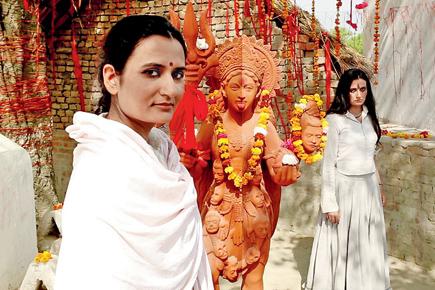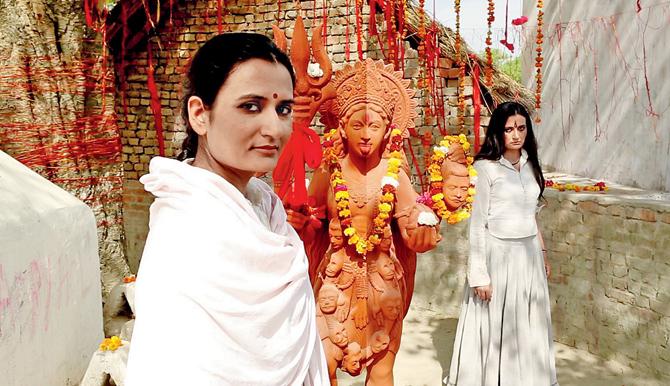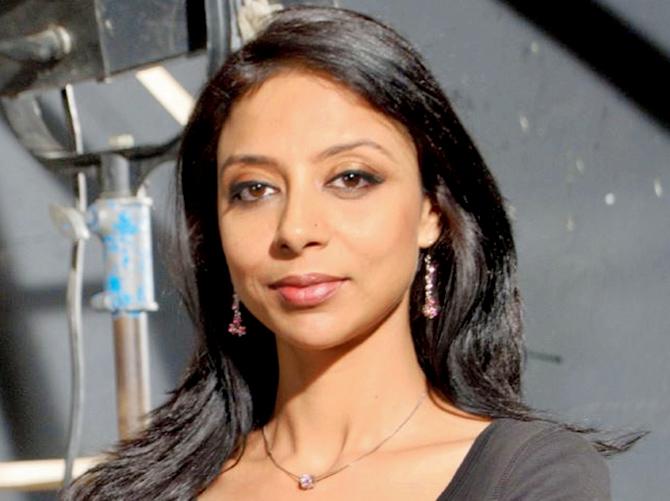Madhureeta Anand’s film on female foeticide in India, has received worldwide acclaim, including support from Eve Ensler. Anand tells Suprita Mitter what makes it special

A still from Kajarya
![]() Q. What made you choose this subject?
Q. What made you choose this subject?
A. You can’t be an Indian woman and a film director, and not at least think about making a film on this subject. But this particular story about a woman from the village, a city woman and a hangman, came to me from a newspaper article. It was an interview of a village dai (midwife). The questions were longer than the answers and the journalist had a very strong moral judgement weaved into her questions. She asked, ‘Don’t you feel bad killing these girls?’ and the midwife said, ‘Yes’. At the end of the interview, the midwife said something that really stayed with me. She said, ‘I’m just the hangman, these girls were sentenced by someone else.’ It occurred to me then that I wanted to make a film on this inherent hypocrisy in our society.
ADVERTISEMENT
Q. How was the experience of shooting in Haryana, that forms the backdrop of the film?
A. Contrary to what happens in the film, it was really great for us. We approached the people in the villages with respect and were totally honest about what we were doing. We knew instinctively what scenes could not be shot in Haryana because it would offend the people. So, we shot these in Delhi or parts of Uttar Pradesh. The secondary cast of the film comprises real villagers. I feel that they are sensitive to the problems but are gridlocked in a system that they don’t know how to break, but people are trying.

A still from Kajarya
Q. What was your interaction with Eve Ensler like?
A. My music composer, Richard Horowitz, is her friend and sent her the link to the film. I got an email from her saying, ‘Thank you for making this film’. To be honest, I was so overwhelmed that I just sat there, staring at the screen. When I recovered, I was thrilled. Then she came to India and we spent a lovely evening together, talking about so many things. I also showed it to activist Kamla Bhasin, who heads One Billion Rising South Asia, and she loved it too. And now, One Billion Rising and Kajarya are working together to see if the film can bring change.

Madhureeta Anand, Filmmaker
Q. Why did you launch the film’s trailer at Delhi’s Jantar Mantar?
A. Can you imagine Kajarya’s trailer being launched in a hotel in Mumbai? I couldn’t either. I started thinking where does this film belong? And it became obvious that it’s Jantar Mantar where all the significant social movements have been kicked off. When I initially suggested the idea, there were all sorts of apprehensions because as filmmakers, we’re not acquainted with something like this. So I asked Kamla Bhasin. She supported me and said that it was a great idea.
Q. The film has done extremely well at International festivals, what kind of response are you expecting in India?
A. We’re releasing the film because we know that this film has the ability to do as well here as it did internationally. At the end of the day it is a riveting thriller, and so once people start watching they’re not going to be able to leave till the end. The challenge will be to drive them to the halls and we are working on that. We have had so much industry support Sudhir Misra, Shoojit Sircar, Kabir Khan, Arbaaz Khan and Randeep Hooda are supporters of the film. And Priyanka Chopra and Sonam Kapoor have tweeted the trailer.
Q. The film looks at the lives of both rural and urban women in India. What according to you would be the similarities/differences in their situation?
A. At a physical level of course they are very different, in apparent and obvious ways. When you look at it at a surface level, I as a woman, who lives independently in Delhi have so many choices. I have control over my finances, I can get into a car and go wherever I like, have the relationships I want, do the work I want to. A woman like me in a village in Haryana has none of these choices. So the conclusion you could reach is that I am emancipated and free and she is not. But in fact we are governed by exactly the same rules that apply to every woman on this earth essentially. There is a feeling/belief no matter where you go that the female sex is somehow flimsy and unwanted. It is the same system that places consumption ahead of social wellbeing or thinks the earth is meant to be marauded for wealth. The manifestation of this thought process is seen differently in different cultures. In the USA for example women are objectified and not paid as much as men. In India it is more extreme.
Q. What were the biggest challenges you faced to make this film?
A. The biggest challenge for films like Kajarya are always to raise money and find a release for it. I wanted to make the film in a certain way which meant that this would have to be an entirely Indie production. And as you know, PVR pictures produced my first film and so I really didn’t know how this new way would work. But then Kajarya is a film from my heart and I think that if your desire to make something is strong, it has to materialise. And so it did and I’m grateful to my producer Tilak Sarkar for funding this film. I don’t at all mind that it took this long to fund, to make and now to release because in a way the hardship was inherent the day I wrote it. And frankly not a damn thing which is worth while doing is ever going to easy.
 Subscribe today by clicking the link and stay updated with the latest news!" Click here!
Subscribe today by clicking the link and stay updated with the latest news!" Click here!






